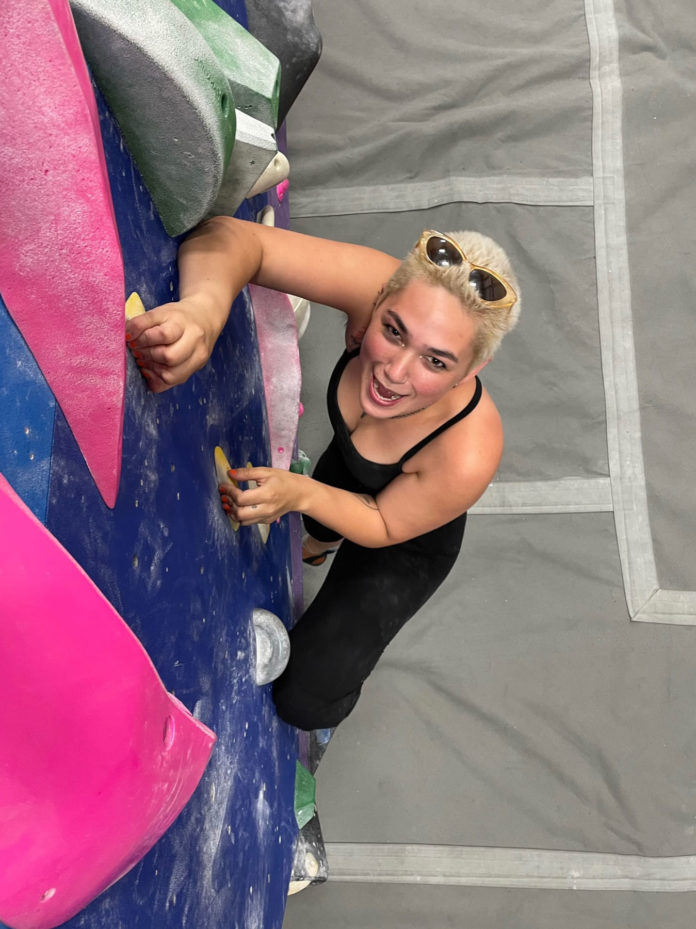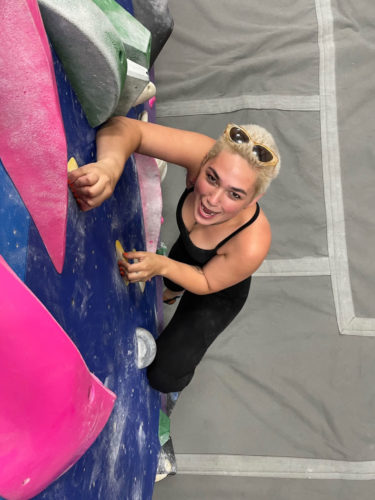
Name: Gabby Zonneveld
Title: Manager, MetroRock Bushwick
Location: Brooklyn, New York
Behind the Desk…is a series that interviews people who are part of the climbing industry—those who manage staff, run programs, and innovate ideas. In this installment, we’re chatting with Gabby Zonneveld, who first “stumbled across MetroRock” a couple years ago while strolling through the Brooklyn neighborhood of Bushwick. Zonneveld was not a climber at the time, but was intrigued by the gym, adding, “We’d all been quarantining for a while and I hadn’t really had a community in a while—I hadn’t had exercise, and there were a lot of things that I was really needing, and immediately fell in love with climbing.”
Zonneveld was initially intrigued by MetroRock’s LGBTQ Day and the welcoming nature of the climbers in Bushwick, stating, “It meant a lot to me in a way that I didn’t anticipate—I’ve never really been a ‘sports person,’ but I was taken aback by how mentally and physically engaging climbing was and how touching the community was, and how quick people were to ask about your life.” Eventually hired on staff and assuming a managerial role, Zonneveld made a point to focus on inclusivity with virtually all the gym’s programming going forward.
BURGMAN: Hearing a bit about your background, it sounds like you basically got interested in climbing entirely on your own, which I think is unique. Oftentimes it’s more of a shared thing—someone drags their friend along to the gym, or someone tries climbing because a coworker is a climber, etc. Right?
ZONNEVELD: Yeah—exactly. I remember watching Free Solo months before I got interested in climbing, and I thought it was just objectively a captivating, amazing story that was really gripping. I remember making my roommates watch it so many times and they were just kind of distracted on their phones the whole time. They weren’t as into it. So, I guess, inherently, there was an element of myself that was drawn to climbing even before I started climbing. But even after watching Free Solo, I didn’t think to try climbing. I had no one in my life who climbed. I think genuinely what grabbed me was seeing how the gym was catering to the queer community—I thought that was really cool, and I didn’t anticipate that.
In terms of eventually becoming the gym’s manager and wanting to focus on inclusivity, what have you found goes into good inclusivity programming?
From my experience working at the gym and also attending the CWA Summit, I’ve found that a lot of it is trusting the climbers and trusting the people at the gym to tell you what’s important to them. And there’s a little bit of ignoring—well, I hesitate to say this—but kind of ignoring the business aspect for a little bit and letting the climbers and the customer base guide some choices. We’ve had some back-and-forth with upper-level management and my level of management and my staff in terms of, for example, offering discounted rates to climbers who aren’t typically represented in the community. From a business (purely profit-based) standpoint, that’s not something a facility would necessarily want to do. But I think that, similar to my own experience, being seen and being actively welcomed into a community can make someone want to bring everyone they know into that same community. I tell so many of my queer friends, and so many female friends, ‘Come to this gym—it won’t feel how you’re expecting it to feel!’ And I think that, in and of itself, can carry a lot of programming choices.
For example, we have different ‘community day’ events—we had an Art of Falling event for our LGBTQ Day, talking about falling safely and fear and that mentality. Also, we had a BIPOC top-rope social, where people could learn how to top-rope from other BIPOC teachers. I think those types of things are what really draw people in and help retain members—giving people a sense of pride in the gym and making them feel included and wanted and seen.
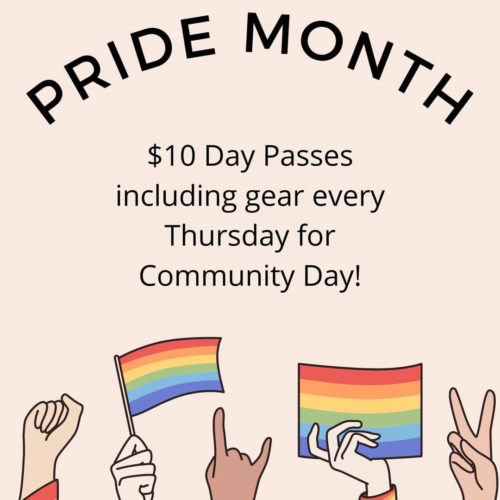
Inherent in all this is the crux for any gym manager, which is catering to the longtime members while also attracting new members—and keeping both groups equally stoked. What’s your managerial strategy for that?
Honestly, it’s about good staffing: Make sure there are enrichment opportunities for your staff and make sure your staff is excited to be at work. A lot of my staff make friends with a lot of the members—there’s a relationship there. A lot of staff know our members by name. That friendship helps break down that figurative wall between the members and the people checking them in. Our staff is encouraged to walk around, to talk about beta, to do safety walks. We did a survey recently with QR codes on the walls and in the bathrooms and whatnot, and when answering the survey, a lot of members mentioned the staff being really welcoming. People said the staff made them feel really safe, made them feel less nervous if they were first-time climbers, and made them want to come back again. I feel really proud of our retention rate for staff; we’ve had a good amount of people working at our gym for more than a year, which is really good for New York City, where there’s typically a lot of turnover, especially recently.
Where does the friendliness of the staff come from? Is that something that is taught and encouraged during on-boarding, or do you try to hire people that already exhibit a noticeable warmth and friendliness?
Hiring people who already have that quality definitely helps—because members can really tell when someone is genuine compared to when the sincerity is just being put on. But I’m not exactly sure. There has been a learning curve for me because this is my first management position and I’m relatively young. But I would like to think some of it is a trickle-down situation, where I try to know what’s happening in all my staffs’ lives. It might seem small and simple, but I think when the staff is comfortable in the space, they’re naturally going to be more open to other people. It’s going to feel less like ‘work’ and more like we’re doing something that we all love in a place that we all love. So, it’s that, plus the baseline of hiring people who are friendly and open-minded.
Let’s talk more about that learning curve. What have been some of the most challenging parts of being a manager at a climbing gym?
Setting boundaries when working at a place that you love has been more difficult than I anticipated. You work, and then you get off work and want to climb since you’re at a climbing gym—but all of a sudden you might realize that you’ve been at the gym for nine or ten hours out of the day. That’s not a sustainable situation if you’re doing that for 50 or 60 hours per week for weeks on end. So, I think learning how to balance that has been a journey. I have also had to learn when to save energy for myself.
I also think there’s a challenging element to being new in the climbing industry—an element of Imposter Syndrome, for sure. I work with a lot of people who have been climbing for over a decade, and I’ll often have to make managerial decisions while not being sure if my decisions are how something is usually done or how it has been done in other gyms. That’s been stressful for me, on a personal level. But I’m really appreciative of the other managers I work with because they will be forthcoming with their knowledge and their experience and anecdotes.
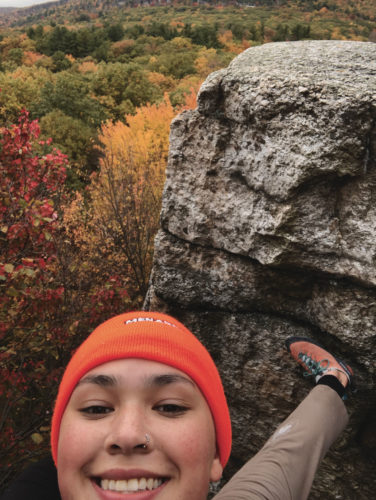
Is this an area where the gym industry at-large could help in some way?
Well, I do think there is an element of having some ‘old heads’ who are, perhaps, elitist, or very gate-keepy about climbing and climbing knowledge. If you were to ask someone on the street to describe what they think a “rock climber” is, they’d probably say, ‘White guy with a beard in their 30s—that kind of energy.’ And there’s kind of a gate-keeping energy that can come across with that. I don’t know if that’s necessarily climbing-specific, though. I also know people who work in music, and there are some similarities in music.
I always want to share my knowledge, and I’m always excited to learn. And so, I think coming into a space and being excited to learn and—if someone is in a position of having a lot of knowledge, being excited to teach and share that knowledge—that’s what’s important and can be helpful. Back to your question, I don’t know if there are things like info-graphics that the industry could produce to help make climbing more accessible, but I do think it’s about a mindset. Who wouldn’t want to share with other people, and who wouldn’t want to learn about such a cool sport?
Not that there’s a simple or single answer, but how does the industry go about changing or evolving its mindset?
Yeah, I certainly don’t have a single answer—I don’t think there is just one answer. I think a lot of industries, in general, are facing these same questions of: What have we looked like previously and what have we been previously, and what do we want to look like moving forward?
I think climbing only has stuff to gain from having more perspectives and having more, different types of people climbing. So, I think actively holding space for those groups and allowing people from different communities to have leadership positions in climbing is a really important first step. And I feel like there have been a lot of climbing gyms in this city that have been working to do that. I think of GP81, I think of The Cliffs Gowanus—other gyms that are also making a point to be inclusive and thoughtful and almost taking the ego out of it. Taking the ego out of it can really be helpful for everyone.
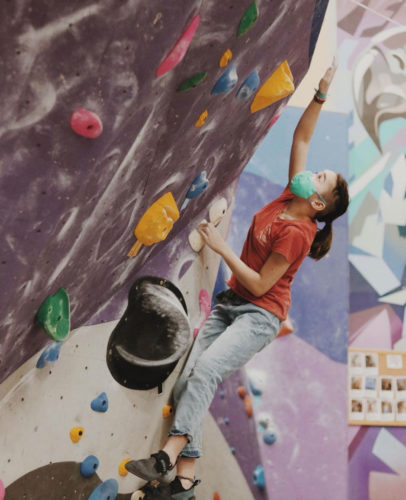
Is there too much ego in climbing?
I’ve personally had a pretty good experience with it all. I don’t know if that’s just circumstantial; MetroRock was my first gym—it’s where I learned, and it’s also my main gym, and it’s where I now work. But I think there’s an element of shifting away from a ‘sending mindset’ and just grade-chasing and all that really macho-istic stuff. I think that’s important and can be very fun to be a part of, but there should also be a focus on ‘Why are we climbing today?’ and ‘Does this feel good?’
For me, giving climbing a more holistic approach has been really fun. I took a Falling and Commitment class based on The Rock Warrior’s Way a while back, and that was really interesting—thinking about ‘why’ we are climbing, ‘why’ we are afraid of taking a whip, ‘why’ are we trying to push through. And a coworker of mine has been working on a burnout program—a journal for hitting the plateau. Like I said, having that holistic approach is more important.
As far as programming at MetroRock, what’s some stuff—either ongoing or upcoming—that you’re stoked about?
Our ‘community days’ are always something I’m excited about. And we’ve been doing some non-climbing-related activities at the gym, which has also been really cool. For example, we had stand-up [comedy] at our gym. And I think, in general, especially going back to the pandemic, a lot of people are looking for a communal landscape right now and a space where they can feel some ownership in. I think having climbing-related events—such as the Iron Maiden competition that we have, which is for women and gender non-conforming folks who don’t often get an exclusive space for themselves—is a really good way to give ownership and get people stoked about the community. Also we’re going to unroll a sliding-scale membership, which I’m really excited about.
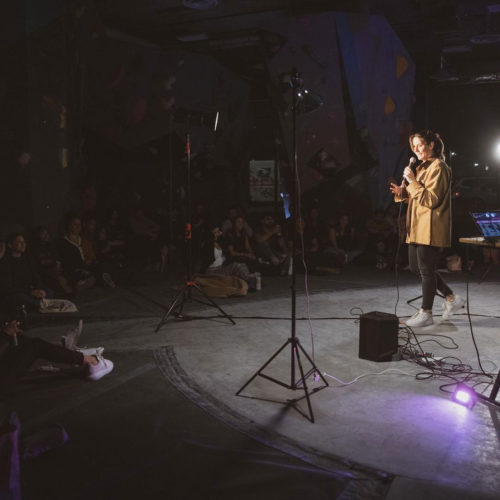
In closing, since MetroRock Bushwick is one of several climbing gyms in Brooklyn and the greater New York City metro area, how do you carve out some uniqueness?
I think there’s an element of agglomeration, in terms of a lot of similar businesses in the area having a symbiotic relationship. There are obviously a lot of moments where that’s not true too. But I went through and tried to give a three-word description of the other climbing gyms in our immediate vicinity, and we realized that we’re not going to be VITAL Brooklyn or GP81; there are gyms for training, and there are gyms for people who are climbing as more of a lifestyle or hobby—and, by the way, none of this is said with judgment about other facilities; I love all those other gyms. But it would be difficult to try and compete in those same categories with other gyms; it would be inefficient. At our core, we feel like a ‘misfit gym.’ I don’t think we have just one type of climbing demographic here. We have a lot of different people who, for whatever reason, maybe didn’t feel like the other gyms were a good fit, or maybe they were searching for a place where they could feel comfortable, or maybe they felt a little bit like an outsider and found our gym. I think that’s been what I’ve tried to lean into.
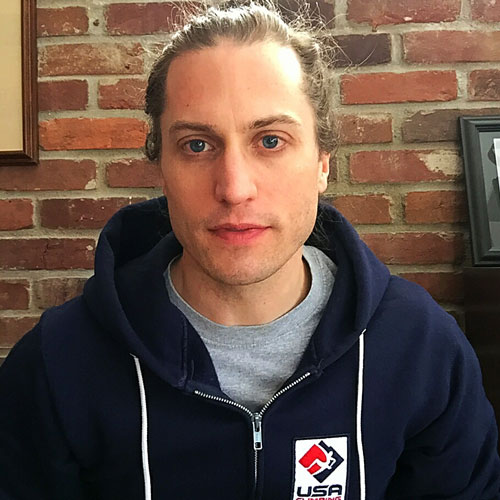
John Burgman is the author of High Drama, a book that chronicles the history of American competition climbing. He is a Fulbright journalism grant recipient and a former magazine editor. He holds a master’s degree from New York University and bachelor’s degree from Miami University. In addition to writing, he coaches a youth bouldering team. Follow him on Twitter @John_Burgman and Instagram @jbclimbs. Read our interview Meet John Burgman, U.S. Comp Climbing’s Top Journalist.




